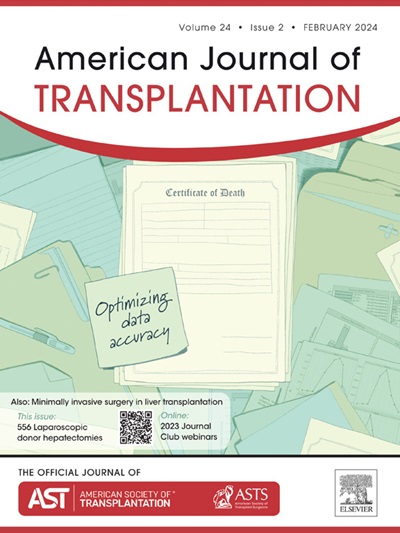训练有素的免疫抑制决定了肾脏异体移植的存活率。
IF 8.9
2区 医学
Q1 SURGERY
引用次数: 0
摘要
先天性免疫系统在调节肾移植免疫反应方面发挥着重要作用,但先天性免疫细胞影响移植物长期存活的机制尚不清楚。目前的研究强调了训练有素的免疫在肾移植存活中的重要作用。训练有素的免疫描述了先天性免疫细胞在受到初始刺激后发生的表观遗传和新陈代谢变化,这种变化使先天性免疫细胞能够对随后的刺激做出更强的炎症反应。我们用肾移植患者移植前和移植后的血清以及免疫抑制剂刺激健康的外周血单核细胞(PBMC)进行体外训练免疫试验,并测量上清液中肿瘤坏死因子(TNF)和白细胞介素-6(IL-6)细胞因子的水平,作为训练免疫的读数。我们的研究表明,移植一周后收集的肾移植受者血清可抑制训练免疫。重要的是,我们发现血清对训练有素免疫力抑制作用最强的肾移植受者很少出现移植物丢失。移植后血清的这种抑制作用很可能是由以前未报道过的免疫抑制药物的作用介导的。我们的研究结果从机理上揭示了先天性免疫在肾脏异体移植存活中的作用,发现了训练有素的免疫力是提高移植物存活率的潜在治疗靶点。本文章由计算机程序翻译,如有差异,请以英文原文为准。
Trained immunity suppression determines kidney allograft survival
The innate immune system plays an essential role in regulating the immune responses to kidney transplantation, but the mechanisms through which innate immune cells influence long-term graft survival are unclear. The current study highlights the vital role of trained immunity in kidney allograft survival. Trained immunity describes the epigenetic and metabolic changes that innate immune cells undergo following an initial stimulus, allowing them have a stronger inflammatory response to subsequent stimuli. We stimulated healthy peripheral blood mononuclear cells with pretransplant and posttransplant serum of kidney transplant patients and immunosuppressive drugs in an in vitro trained immunity assay and measured tumor necrosis factor and interleukin 6 cytokine levels in the supernatant as a readout for trained immunity. We show that the serum of kidney transplant recipients collected 1 week after transplantation can suppress trained immunity. Importantly, we found that kidney transplant recipients whose serum most strongly suppressed trained immunity rarely experienced graft loss. This suppressive effect of posttransplant serum is likely mediated by previously unreported effects of immunosuppressive drugs. Our findings provide mechanistic insights into the role of innate immunity in kidney allograft survival, uncovering trained immunity as a potential therapeutic target for improving graft survival.
求助全文
通过发布文献求助,成功后即可免费获取论文全文。
去求助
来源期刊
CiteScore
18.70
自引率
4.50%
发文量
346
审稿时长
26 days
期刊介绍:
The American Journal of Transplantation is a leading journal in the field of transplantation. It serves as a forum for debate and reassessment, an agent of change, and a major platform for promoting understanding, improving results, and advancing science. Published monthly, it provides an essential resource for researchers and clinicians worldwide.
The journal publishes original articles, case reports, invited reviews, letters to the editor, critical reviews, news features, consensus documents, and guidelines over 12 issues a year. It covers all major subject areas in transplantation, including thoracic (heart, lung), abdominal (kidney, liver, pancreas, islets), tissue and stem cell transplantation, organ and tissue donation and preservation, tissue injury, repair, inflammation, and aging, histocompatibility, drugs and pharmacology, graft survival, and prevention of graft dysfunction and failure. It also explores ethical and social issues in the field.

 求助内容:
求助内容: 应助结果提醒方式:
应助结果提醒方式:


